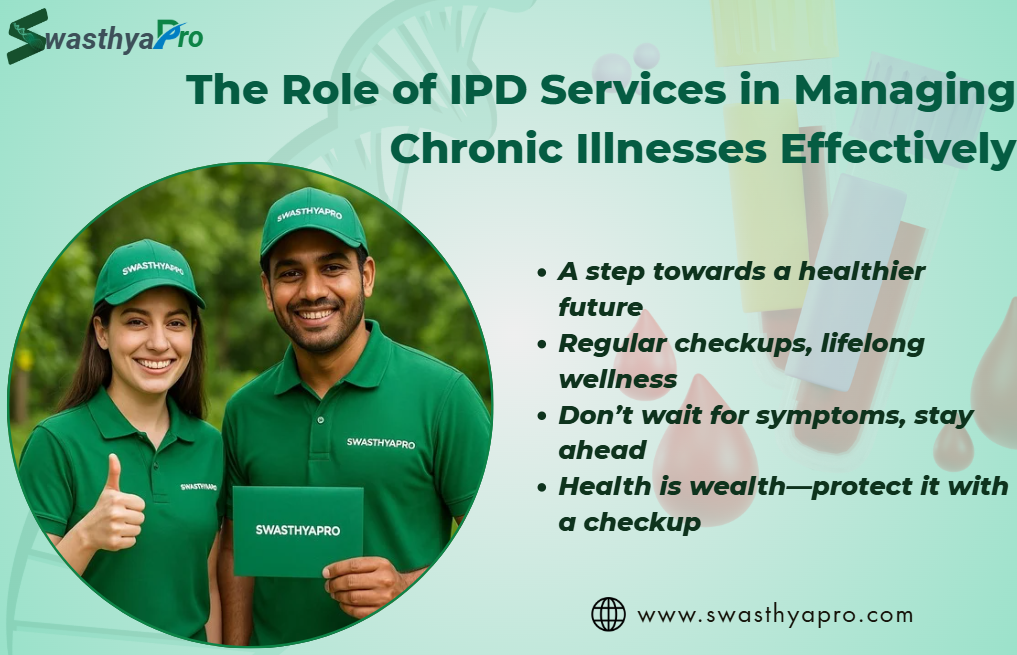The Role of IPD Services in Managing Chronic Illnesses Effectively

Chronic illnesses, such as diabetes, heart disease, and kidney disorders, require ongoing care and monitoring to prevent complications. IPD services (Inpatient Department services) play a vital role in managing these long-term conditions by providing continuous supervision, specialized treatment, and a structured environment that supports patient health and well-being.
Why Chronic Illness Management Requires IPD Services
Chronic illnesses often involve complex treatment plans, multiple medications, and regular monitoring of vital signs. Outpatient care alone may not be sufficient for patients experiencing severe symptoms, complications, or sudden changes in their condition. IPD services ensure that patients receive round-the-clock care, enabling early detection of issues and timely interventions.
By staying under continuous supervision, patients with chronic illnesses can avoid unnecessary emergencies and hospital readmissions. IPD services provide a safe, controlled environment where healthcare teams can monitor progress, adjust treatments, and address complications promptly.
Key Components of IPD Services for Chronic Illnesses
Effective management of chronic illnesses through IPD services involves several essential components:
-
Medical Supervision – Doctors regularly evaluate patient conditions, adjust medications, and provide specialized care tailored to chronic illness needs.
-
Nursing Care – Nurses administer medications, monitor vital signs, and support daily activities, ensuring patient safety and comfort.
-
Diagnostic Monitoring – Access to lab tests, imaging, and other diagnostics helps track disease progression and treatment effectiveness.
-
Medication Management – Careful coordination ensures proper dosing, timing, and adherence to complex medication schedules.
-
Lifestyle and Dietary Support – Nutrition plans and lifestyle guidance help manage chronic conditions and improve recovery.
These components work together to provide holistic care that addresses both immediate symptoms and long-term health goals.
Benefits of IPD Services in Chronic Illness Management
IPD services offer multiple benefits for patients living with chronic illnesses:
-
Continuous Monitoring – Regular observation allows early detection of complications, reducing the risk of severe episodes.
-
Personalized Care – Treatment plans are tailored to individual patient needs, improving effectiveness.
-
Better Medication Adherence – Supervised administration ensures patients take medications correctly.
-
Rapid Intervention – Immediate medical attention is available if conditions worsen.
-
Patient Education and Support – Patients and families receive guidance on managing illnesses at home.
These benefits highlight how IPD services improve health outcomes and quality of life for patients with chronic conditions.
Technological Support in IPD Services
Technology enhances IPD services for chronic illness management. Electronic health records (EHR) allow doctors and nurses to track patient history, medications, and test results efficiently. Bedside monitoring systems provide real-time data on vital signs, alerting staff to any changes in health status.
Advanced diagnostic tools, such as imaging and lab systems, help identify complications early. Telemedicine and remote consultations enable specialists to provide input even if they are not physically present, ensuring patients receive expert care at all times.
Role of Healthcare Professionals
A multidisciplinary team is essential in IPD services for chronic illness management. Doctors, nurses, dietitians, and physiotherapists collaborate to deliver comprehensive care. Regular communication between team members ensures that treatment plans are coordinated, safe, and effective.
Patient-centered approaches, including counseling and emotional support, help patients cope with the stress of chronic illness. The combination of skilled professionals, attentive care, and patient education is key to the success of IPD services.
Challenges in Managing Chronic Illnesses with IPD Services
Challenges include high patient volumes, complexity of care, and ensuring consistent adherence to treatment protocols. Managing multiple chronic conditions in one patient requires careful coordination and monitoring.
Hospitals must address these challenges through well-trained staff, efficient workflows, and the integration of technology to maintain the quality of IPD services.
The Future of IPD Services in Chronic Care
The future of IPD services in chronic illness management is likely to be shaped by personalized medicine, predictive analytics, and AI-assisted monitoring. Smart hospital systems will track patient health trends and predict potential complications, allowing preemptive care.
Enhanced patient engagement tools, digital monitoring, and telemedicine integration will expand access to specialized care, ensuring that patients with chronic illnesses receive consistent, high-quality management.
Conclusion
IPD services are crucial in managing chronic illnesses effectively. Continuous monitoring, personalized treatment plans, medication supervision, and supportive care create an environment where patients can recover safely and maintain long-term health.
By combining skilled healthcare professionals, advanced technology, and patient-centered practices, IPD services ensure better outcomes, improved quality of life, and reduced complications for patients living with chronic illnesses. IPD services are not just about hospitalization—they are about comprehensive care, continuous support, and effective management of complex medical conditions.
- Art
- Causes
- Best Offers
- Crafts
- Dance
- Drinks
- Film
- Fitness
- Food
- Jocuri
- Festival
- Gardening
- Health
- Home
- Literature
- Music
- Networking
- Alte
- Party
- Religion
- Shopping
- Sports
- Theater
- Wellness



